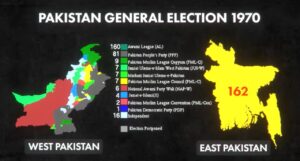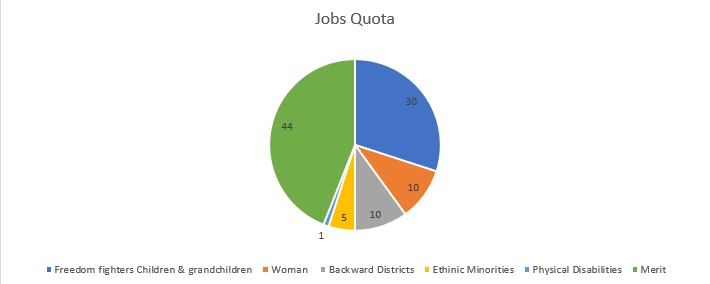“A patriot must always be ready to defend his country against his government”- Edward Abbet [An American Author]
This article will cover some historical background concerning the protests, reservation ratio among Bangladeshi citizens, and the unemployment and future consequences in the countryside.
Extreme and violent protests have broken out in Bangladesh after July 15, when the government forces and supporters attacked the students protesting against a 30% quota in government jobs for families of war veterans who fought for the country’s independence in 1971. In the country, 56% of jobs were reserved for freedom fighter families, women, and people from underdeveloped districts, and the remaining 44% of jobs were on merit.
Before Independence:
Before its independence, Bangladesh was part of Pakistan. It was called East Pakistan and the current Pakistan was West Pakistan. East Pakistan was socially discriminated against, despite the majority of Bengali speakers, the Urdu language was imposed on them by West Pakistan. There was also economic discrimination as 59% of exports were from East Pakistan with only 25% of industrial investments. In 1970, one of the deadly tropical Bhola cyclones hit East Pakistan and killed an estimated three hundred thousand people but West Pakistan failed to provide any release efforts.
Political discrimination was also seen in the year 1970 General Election, where In West Pakistan (Now Pakistan), people voted for various political parties. The majority came out with only 138 seats, while in East Pakistan (Now Bangladesh), the overwhelming majority of the votes to only a single party, the Awami League led by Sheikh Mujibur Rahman made 162 seats. Ideally, the Awami League party should govern the states but Yahya Khan- the Military Chief, did not accept the result hence imposing martial law in East Pakistan (Now Bangladesh). In response to this, a civil disobedience movement was initiated which further took a different scenario in the East Pakistan. Sheikh Mujibur Rahman was arrested, atrocities started by West Pakistan and thousands of people killed. It took the shape of mass genocide in East Pakistan. Almost 10 million people became refugees in India and 50% population was internally displaced. All atrocities and circumstances lead us to witness the BANGLADESH LIBERATION WAR OF 1971. This is the same war where India helped Bangladesh to get independence from West Pakistan under the prime ministership of Honourable Smt. Indra Gandhi.
The people who fought against West Pakistan and made Bangladesh Independent are the freedom fighters and these freedom fighters are relevant to the quota system. The current quota distribution can be understood by the following chart.
All quota constitutes 56% and the majority is 30% which is for the freedom fighters’ children and grandchildren.
As majority of the protestors believed that quota allocations for ethnic minorities and people with disabilities are just fine but there should be a reformation in the quota system, especially 30%.
Reservation for the freedom fighters started in 1972 only after a year of Independence, and in the same year through an order issued by the Ministry of Cabinet Services, 30% of jobs were only for freedom fighters. This facility was extended to the children of freedom fighters in the year 1977. Again in 2010, further expanded to include grandchildren of freedom fighters.
In February 2018, one of the student associations (General Student Right Conservation Council) initiated the Quota Reform Movement. The same year being under pressure the government of Bangladesh issued a circular and removed the quota for the recruitment of first- and second-class jobs. Later, in the year 2021, 7 kids from freedom fighter families filed a petition in the High Court challenging the government’s 2018 circular. The High Court came with its verdict on 5th June 2024, declaring that the circular introduced in 2018 is illegal and hence the quota was restored. This decision of the high court leads a massive protest countrywide. Protestors claimed this quota allocation was unconstitutional as giving it to children and grandchildren of the freedom fighters. Awami League continued in power for the last 15 years. More than 60,000 thousand objections were raised for the people to be on the list of freedom fighters and also these objections have not been resolved by the government.
Also read: HAS INDIA BECOME THE WORLD CAPITAL OF EXAM PAPER LEAKS?
The protests continued nationwide including students, teachers, opposition party (BNP). The situation turned worse and to confront the protestors, the government deployed 7000+ paramilitary troops, and police used rubber bullets, teargas, and sound grenades to control the situation. On 10th July 2024, the government approaches the Supreme Court against the HC verdict. SC issues the status quo on the HC order for a month.
Later on 21 July 2024, SC ordered that the quota for Veteran’s descendants be cut to 5% with 93% of jobs to be allocated on merit. The remaining 2% will be set aside for the members of ethnic minorities and transgender and disabled people.
Conclusion:
Protestors demand is not unreasonable. Any reservation system should uplift the socio-economic deprived people while the Bangladesh freedom fighters’ descendants are not the deprived people. They are a socially respected section of the country. If there is any economically weak among them, then a separate 5-10% EWS quota could be introduced. Moreover, a democratic country should always have transparency in any of its policies and should always be supported by the majority of the citizens.
Points to think of:
- In the country of 170 million people, more than 30 million are not in work or have education.
- Bangladesh went to the IMF in 2022 for help to rebuild the depleted foreign exchange reserve. It is also currently in talks with China for a loan of about $5 billion to bolster those reserves.
- The country has an inflation rate of 9%
- In the Bangladesh Public Service Commission exam, more than 4 lakh graduates compete for only about 3000 civil service jobs.
Reservation is a temporary issue in the state, unemployment is going to be a long-term challenge for the government. It is the time to focus on the job opportunities.


